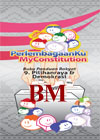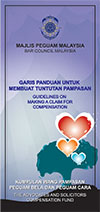 News/Notices
News/Notices  News
News  Echoes of the Past
Echoes of the Past  Weakened federalism in the new federation
Weakened federalism in the new federation | Weakened federalism in the new federation |

|

|

|
| Wednesday, 25 July 2007 07:15am | |
|
©The Sun
(Used by permission) Malaysian forces man observation posts set up on the rugged coast of Sabah during the confrontation with Indonesia. The posts faced the Indonesian-held par of Sabatic island. They keep a constant watch, with three other observation posts, across the 16km strip of international waters. THE defeat of the Malayan Union project (1946-1948) left two legacies for the later Federation of Malaysia. The first was Umno’s dominance which has since prevented the emergence of liberal and plural democracy in Malaysia. The second was federalism. Umno demanded for federalism because the Malayan Union was a unitary state which denied the nine Malay states their sovereignty and transformed them from protectorates, technically speaking, into de jure colonies. The 1948 entity of the Federation of Malaya borrowed ideas from other Anglophone federations like India, Australia and the United States. Had it worked out well, the second legacy may have been the remedy for the first. After all, in federalism, sovereignty and power are shared between national and sub-national entities. Such vertical divisions of power between the governments at different levels provide for check-and-balance, just like the horizontal separation of power between the three branches of government: legislative, executive and judiciary. The logic is simple: with free and fair elections, it is unlikely that a single party can monopolise governments at all levels resulting in an effective, but undesirable, fusion of party and state. How far this works, however, very much depends on the actual degree of decentralisation. Many nominally unitary states, including the UK, have transferred substantial amounts of power to lower level governments. While devolution to provincial governments aims to arrest separatist demands, decentralisation in jurisdictions like education, transportation, and the police allows responsiveness and adaptation to local needs. In contrast, our federalism is highly centralised. Our federalism gives the federal government not only the most legislative and executive powers but also the most important sources of revenue. State governments are excluded from the revenues of income tax, export, import and excise duties, and they are also largely restricted from borrowing internationally. They have to depend on revenue from forests, lands, mines, petroleum, the entertainment industry, and finally, transfer payments from the central government. Such restrictions however did not stop political pluralism from flourishing via federalism in the past. In 1959, the ratio of state government control between the Alliance and PAS was a healthy 9:2. PAS won 28 out of 30 state seats in Kelantan, which it ruled alone until 1973 and in coalition with the Alliance until 1977, shortly before losing it to Umno in the 1978 state elections. Its hold on Terengganu in 1959 was much weaker with its capture of 13 out of 24 seats, while the Alliance held seven and Datuk Onn Jaafar’s Parti Negara the remaining two. A no-confidence vote, aided by defection, ended the opposition state government there two years later. The federal-state relation between the Alliance and PAS then was far from friendly. PAS accused Umno of not helping the Malays while Umno slammed PAS for administrative incompetence. The electorate in the PAS stronghold were threatened with no development and not unlike the tactics used in later years, the central government sometimes bypassed the state in delivering financial aid. The establishment of Malaysia in 1963 worsened federal-state relations as the Kelantan state government was not consulted and was actually opposed to the favourable conditions granted to the new states of Singapore, Sabah and Sarawak. In the subsequent 1964 elections, during the period of konfrontasi with Indonesia, PAS was accused of being supported by Indonesia and hence, of disloyalty. New states, worse conflicts However, the conflicts between the Federal Government and the new states of Singapore, Sabah and Sarawak soon dwarfed the antagonism between Kuala Lumpur and Kota Baru. Within three years of Malaysia’s birth, one of these defiant trio - Singapore - faced expulsion and another - Sarawak - had a regime change delivered via centrally-imposed emergency rule. Kelantan eventually had its emergency rule, too, in 1977. One may understand better the intolerance of the Alliance federal government by studying the raison d’etre and context of the larger federation. Tunku moved the idea of a Malaya-Singapore merger in 1961 to prevent the island from falling into the hand of the communists and becoming a Cuba in Malaya’s backyard. This concern was shared by Singapore Chief Minister Lee Kuan Yew. The federation was also expected to benefit from Singapore’s trading port. Meanwhile, Sabah, Sarawak, and originally also Brunei, were brought into the picture for two reasons. Firstly, Borneo’s native population, classified as bumiputra together with the Malays in Malaya, would help restore the “native-immigrant” ethnic balance after the addition of Singaporean Chinese and Indians. It is noteworthy, however, that in 1963, the Chinese and Indians made up 51% of newly-formed Malaysia’s population while the bumiputra constituted only 47%. The second reason for expanding the federation was that Britain was ready to relinquish her Borneo colonies, and Kuala Lumpur definitely preferred them to be “family” rather than just independent neighbours or part of Indonesia or the Philippines. As Malaysia was very much a cleverly-calculated answer to different challenges, assertive states with their own mind would reduce, if not remove altogether, the expected payoff for the merger’s chief architect, mover and beneficiary - Kuala Lumpur. Hence, while state autonomy and rights were not seen as a threat to national cohesion and territorial integrity for Malaya in the late 1940s, it had become so for Malaysia in the 1960s. The sense of insecurity in Kuala Lumpur was perhaps also accelerated by the threats from Indonesia and the Philippines, both of which had territorial ambitions over the Borneo states. » Singapore was both the first challenger, and the first arena of rivalry. Politically the most sophisticated among the new Malaysian states, it had become self-governing by 1959. While the Malayan Alliance organised pro-Malaysian parties in Sarawak and Sabah into the Sarawak Alliance and the Sabah Alliance as sister parties, the same did not happen in Singapore. When Singapore had its election in 1963, the Malayan Alliance organised a Singapore Alliance to contest against the ruling People’s Action Party (PAP). All Alliance candidates met their Waterloo, including those of Singapore Umno, which lost to PAP’s Malay candidates. In retaliation, PAP contested 11 federal seats in Malaya in the 1964 elections. PAP attacked the MCA, which it blamed for the 1963 rivalry and accused of corruption and incompetence. Although winning only one seat in the peninsula, the Kuala Lumpur Parliament saw PAP parliamentarians from Singapore crossing swords with Alliance ministers over both the economic interests of Singapore and the rights of non-Malays nationwide. Because its wish for a coalition government with Umno or the Alliance was rejected both before and after the elections, the PAP decided to build an alternative coalition, the Malaysian Solidarity Convention, with four other parties from Malaya and Sarawak. PAP’s plan of a Chinese-Bornean pact upset the Malay-Bornean coalition envisioned by Umno when Malaysia was designed. Vowing to replace Umno’s “Malay Malaysia” with a “Malaysian Malaysia”, both the PAP and Lee Kuan Yew began to eye the positions of Umno and of Tunku Abdul Rahman. Instead of detaining Lee and PAP leaders under the Internal Security Act, as some in his party demanded, Tunku eventually chose to expel Singapore altogether on Aug 9, 1965 to end the standoff. » In Sabah, Donald (later Fuad) Stephens, who led the Sabah Alliance government, fell out with Kuala Lumpur as he firmed up his position on the so-called “Twenty Points” – specific state rights in matters like immigration, religion, language and education that were granted to Sabah and Sarawak upon the formation of Malaysia. He resigned as chief minister in December 1964 to give way to Kuala Lumpur loyalist Tun Mustapha Datu Harun, and as compensation was given a federal ministership which he eventually lost in August 1965 when his party questioned Singapore’s expulsion.
When the Sarawak National Party (SNAP) leader was reinstated by the Borneo High Court and wanted to call an election to resolve the 1966 deadlock, the Federal Parliament passed a bill of Emergency Rule in Sarawak and amended the state constitution. This secured the desired regime-change and power eventually passed from the Christian Ibans to the Muslim Melanau who enjoyed more of Kuala Lumpur’s confidence. By 1966, the defiant new states were either expelled or tamed. Kelantan remained the only state ruled by the Opposition, just as it was before the birth of Malaysia. The post-1969 cooptation of opposition parties further eliminated all opposition state governments. From 1973 to 1990, with the brief exception of Sabah in the mid-80s, there has only been one government in Malaysia – the same one - at federal, state and local levels. The ruling party was the state, as such. Many Malaysians cannot imagine any other scenario because they have never had any other experience. Even after 1990, there have only been either one or two opposition state governments at a time. Ironically, the expansion of the Federation in 1963 has somewhat failed federalism in Malaysia. Wong Chin Huat is reading electoral system at University of Essex for his PhD and lectures in Arts at Monash University - Sunway Campus. He is currently co-editing a book on the 2004 general elections with Prof Noraini Othman at Ikmas, UKM.
Set as favourite Share Email This Comments (0)
 Write comment
You must be logged in to post a comment. Please register if you do not have an account yet.
|
| < Prev | Next > |
|---|





 » A stronger defendant of state rights, Sarawak’s first Chief
Minister Stephen Kalong Ningkan fiercely resisted Kuala Lumpur’s intention
to remove him through an orchestrated revolt of Sarawak Alliance state
legislators.
» A stronger defendant of state rights, Sarawak’s first Chief
Minister Stephen Kalong Ningkan fiercely resisted Kuala Lumpur’s intention
to remove him through an orchestrated revolt of Sarawak Alliance state
legislators.





















